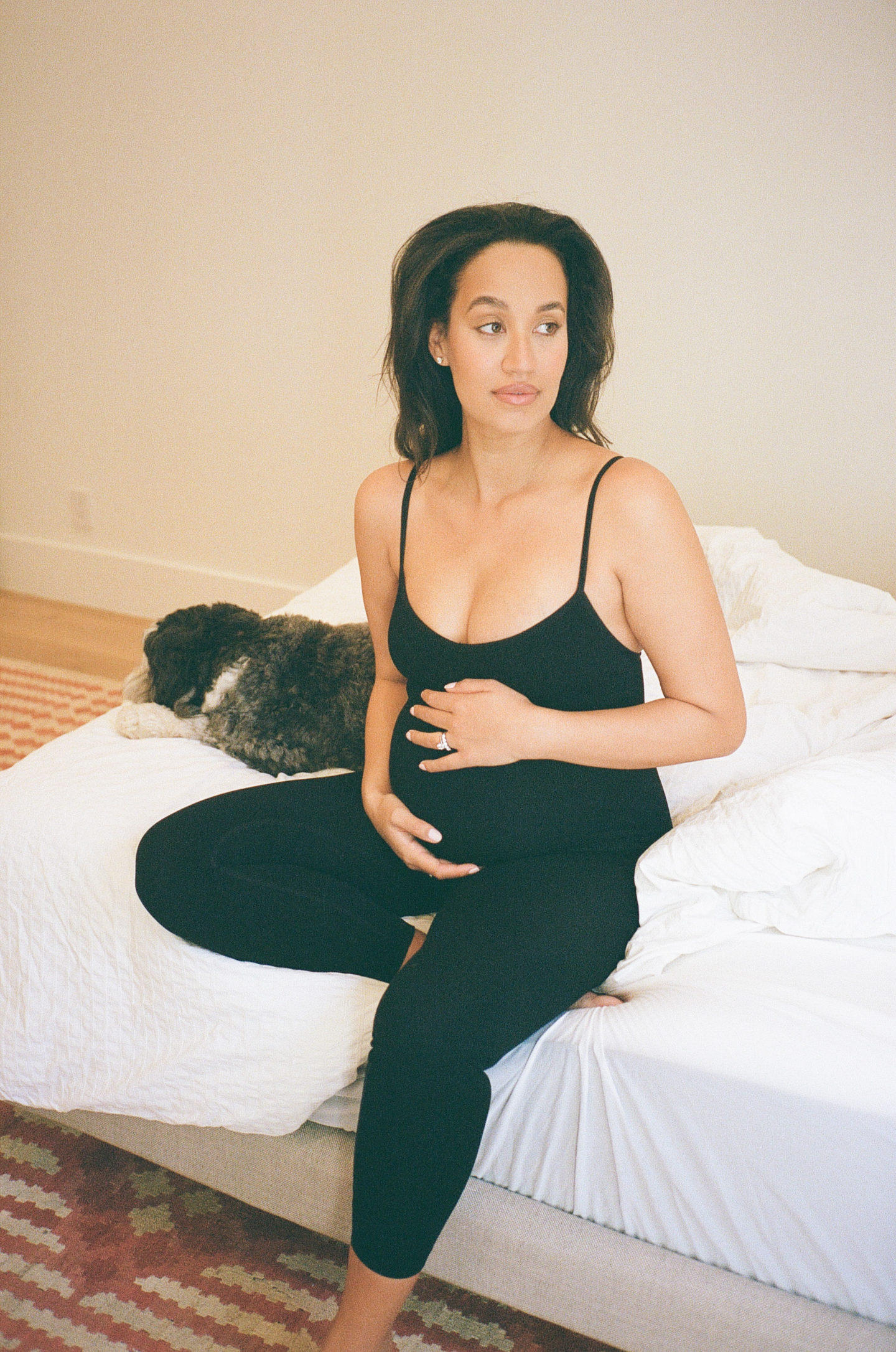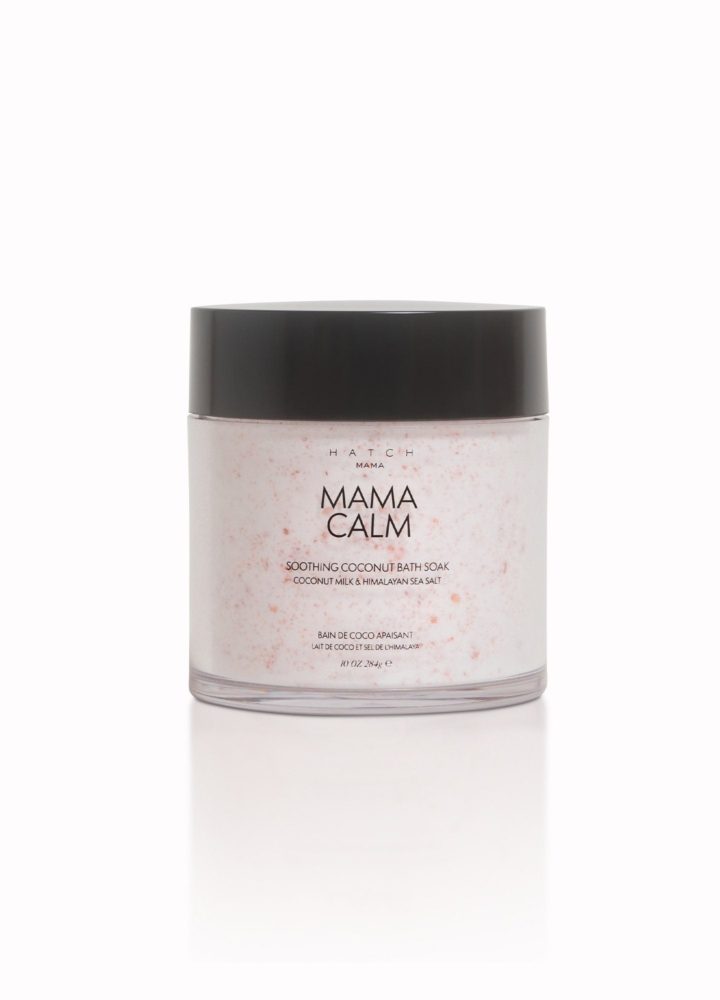You’re tossing and turning for what seems like the 20th night in a row, unable to get comfortable because of… leg cramps? Back pain? Or maybe just plain old insomnia is getting in the way of your Z’s.
The list of pregnancy symptoms that may interfere with your sleep quality is nearly endless, and yet a good night’s sleep has never been so important. But many doctors advise against taking melatonin supplements and other over-the-counter sleep supplements while pregnant, putting you in quite the pickle, especially if you deal with a sleep disorder like insomnia.
Luckily, there are a few pregnancy-safe melatonin alternatives out there — and here at HATCH, we’ve got you covered with the 411 about all of them. Keep reading for all of your questions about alternative sleep remedies answered, as well as our three favorite options, below.
What Is Melatonin, and Can I Take It While Pregnant?
You know when it starts getting dark early in the winter, and all of a sudden, you find yourself completely exhausted at 5 pm? You can thank melatonin for that feeling.
What Is Melatonin?
Melatonin is a hormone naturally produced by your brain to prepare your body for its natural sleep-wake cycle. As it gets dark out, melatonin levels ramp up; when you’re exposed to natural light, melatonin production is blocked, which can cause poor sleep.
The ebb and flow of melatonin controls your circadian rhythm — your natural peaks and dips in energy throughout the day. This is why drowsiness sets in; it’s your body’s way of telling you that it’s sleep time.
That’s one reason why docs tell us to avoid scrolling on our phones in bed — the blue light emitted from your phone screen can interfere with melatonin production and sleep quality.
Adorable pajama set on = phone off!
High-quality melatonin supplements are generally regarded as safe for long-term use and can be bought over the counter at nearly every pharmacy. They’re often used by shift workers to get to sleep during the day or by travelers adjusting to jet lag instead of prescription medications.
Pregnancy and Melatonin: Is It Safe?
However, research regarding the use of melatonin during pregnancy is limited, so the potential side effects aren’t entirely known. The brain normally produces melatonin, but during pregnancy, your ovaries and placenta produce it as well — an extra dose of sleepytime hormones, just for the baby. Scientists aren’t sure exactly how this extra ingested melatonin impacts a growing fetus. Therefore, many tend to recommend avoiding it as a supplement during pregnancy.
And as with other over-the-counter supplements, melatonin is not regulated by the Food and Drug Administration (FDA) — meaning the possible side effects of melatonin on a developing fetus and information about safe dosage levels are unknown.
Health experts also generally advise against using melatonin as a sleep aid for insomnia, which often fits the bill for the sleep problems many pregnant women encounter. So whether you’re pregnant or just have been struggling to get some shuteye for a few weeks, it might be time to ditch the gummies and try out one of these melatonin alternatives instead.
Option One: Antihistamines
Picture the last time you had an allergic reaction. Maybe you went for a walk on the first day of spring and returned to the house sneezing all over your favorite maternity jumpsuit. You popped a Benadryl to cope, and 20 minutes later, you were knocked out cold. Sounds like the ideal scenario next time you’re facing another restless night, doesn’t it?
In fact, the CDC estimates that up to 15% of pregnant women have used the calming effects of an antihistamine to deal with sleep issues during pregnancy. The active ingredients in certain antihistamines, including Benadryl, make most people super sleepy.
The CDC has generally found Benadryl to be safe to take during pregnancy, meaning it could be the answer in your search for a good night’s sleep. However, not everyone is the same, so chat with your doc before adding Benadryl to your shopping list.
The sleepiness side effects of antihistamines are due to diphenhydramine or doxylamine succinate (the active ingredient in Unisom sleep tabs). Both have been approved by the FDA as safe and non-habit forming, although they do tend to lose efficacy over time.
Unisom tabs, in particular, could be a good option during pregnancy — they are also used to treat nausea and vomiting. Two birds with one stone, anyone?
However, antihistamines should be used sparingly. They can be helpful for short-term sleep problems, but because they lose efficacy over time, antihistamines aren’t a good long-term solution and can cause sleep disturbances in the long run.
Option Two: Magnesium
If you’re looking for a long-term fix for your pregnancy sleep problems, try adding a magnesium supplement to your bedtime routine. Magnesium is a mineral that regulates many bodily functions, including blood pressure, blood sugar, and nerve and muscle function.
Magnesium deficiencies are relatively common, especially among women. So you may want to add some magnesium-rich dark leafy greens, whole grains, nuts, and legumes to your menu. Or, add a natural supplement containing magnesium to your daily supplement lineup (with your doctor’s approval).
Many people rely on magnesium as a natural sleep aid to get to sleep easier, improve sleep quality, and even manage restless legs syndrome. While research on magnesium as a natural sleep aid is still thin, one theory suggests that the mineral supports the neurotransmitters directly involved in sleep (and stress).
It’s also possible that the better sleep quality attributed to magnesium is just a placebo effect — which, let us clarify, we are NOT upset about. When it’s been weeks since you’ve had a good night’s sleep, getting to dreamland at all is a success, never mind if you have to trick your body to do so.
Some early research suggests that magnesium can help support a healthy pregnancy and possibly reduce unpleasant symptoms like hypertension and leg cramps. Taking a magnesium supplement 30 minutes before bed might just be the secret key to the land of sweet dreams.
Option Three: Tryptophan
Tryptophan is a key amino acid naturally found in foods like whole milk, turkey, chicken, canned tuna, and oats. While all amino acids support overall health, tryptophan is especially important during pregnancy because of its role in supporting fetal growth and development.
And aside from being part of your diet, tryptophan may possibly help reduce the amount of time it takes to fall asleep each night with virtually no side effects. One theory for why this works is that tryptophan promotes the synthesis of serotonin, which can naturally improve sleep quality (although, like many other “natural” sleep aids and supplements, there is room for a lot more research on this).
Talk to your doctor before incorporating tryptophan into your bedtime routine. Tryptophan supplements are available in practically every pharmacy or supermarket vitamin aisle, but as with any dietary supplement, it’s important to get your doctor’s approval to ensure there are no interactions or side effects with other medications or supplements you may take.
What About Valerian Root?
One of the most effective natural sleep aids has been around for almost 2,000 years: valerian root. Valerian root has been used to treat a whole host of ailments, including anxiety, stomach cramps, restlessness, and insomnia.
Valerian root is listed as “Generally Recognized As Safe” by the FDA and is commonly used as a gentle alternative to sleeping pills or other prescription sleep aids. One study found valerian root to be as effective as a placebo at improving sleep quality after two weeks and significantly more effective after four, indicating that it may need time to build up in your system before it reaches full potency.
But despite knowing that valerian does work to treat sleep problems, scientists aren’t exactly sure how it works. One theory is that over time it increases the amount of gamma-aminobutyric acid (GABA) in your brain, which helps reduce anxiety and regulate the nervous system.
Sounds pretty great, right? Unfortunately, though, valerian root has not been approved for use while pregnant (or breastfeeding — if you decide to nurse your little one, you’ll likely want to follow all of the same supplement and dietary guidelines you did while pregnant.)
As a supplement, it doesn’t go through the same rigorous FDA approval process as an over-the-counter medication; and what’s more, some studies have linked valerian to low zinc levels in the brain, a potentially harmful side effect for you or your growing baby. So if you’re searching for a melatonin alternative, skip the valerian root for now.
Sleep Well and Take Care!
Sleep is critical for overall health and well-being. If you’re desperate for a good night’s sleep and haven’t found a melatonin alternative that works for you, talk to your Ob/Gyn or healthcare provider. They will be able to make recommendations and help you figure out a plan to get that restful sleep you deserve!
Sources:








